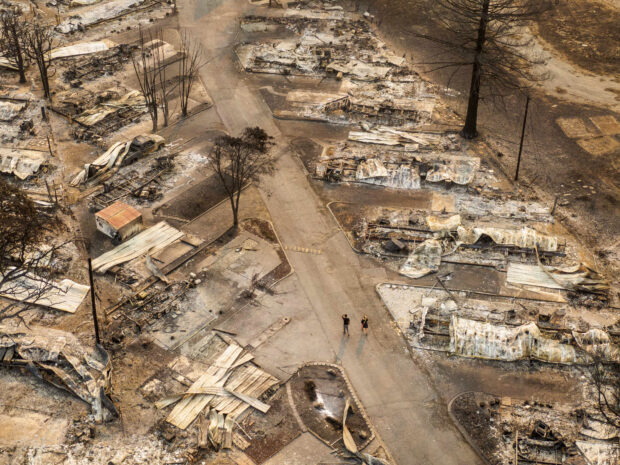Berkshire Hathaway Inc.’s PacifiCorp now faces a demand for $30 billion from victims of Oregon’s 2020 Labor Day wildfires, an escalation of a legal onslaught on the largest grid operator in the western US.
While the amount sought in an amended complaint filed Monday is about two and a half times what the utility is worth, it’s also much bigger than the payout PacifiCorp might be expected to face based on claims resolved so far.
The growing liabilities for PacifiCorp prompted Berkshire Chairman Warren Buffett to warn in his annual letter to investors that wildfires have turned utilities across the western US into risky investments. Utilities in California, Colorado, Hawaii and Texas have also faced billions in fire liabilities.
A jury already found PacifiCorp liable in 2023 for its role in the fires, but victims must undergo separate trials to determine individual damages. The new filing in state court in Portland formally adds the names of 1,000 residents who are covered by a class action case over the destruction of about 2,500 properties in western Oregon.
Jurors so far have awarded 36 plaintiffs a total of about $220 million — an average of $6 million per person. That’s far less than the $30 million per person that victim lawyers are seeking in Monday’s filing, which asks for up to $5 million to compensate for actual losses and as much as $25 million for psychological trauma.
PacifiCorp, which is appealing last June’s verdict of gross negligence, previously lambasted the amount of damages sought by the plaintiffs.
“The idea that any of the numerous plaintiffs with minimal economic damages and no physical injuries are nevertheless entitled to $25 million in noneconomic damages is delusional,” PacifiCorp lawyers wrote in an October court filing.
Lawyers for plaintiffs declined to comment on Monday’s filing.
Berkshire said in a recent regulatory filing that it faces fire claims in Oregon and California of about $8 billion. That includes demands from state and US government agencies totaling more than $1 billion for various firefighting and cleanup costs.
The utility was accused at last year’s trial of failing to heed weather warnings and shut off electricity in its service areas ahead of a wind storm that toppled power lines.
“We think a settlement in the mid- to high-single-digit billions is the most likely outcome. Both sides have incentive to settle. Going to trial with all class plaintiffs is risky for PacifiCorp as it’s already lost the first three jury trials, with verdict amounts that point to potential damages in the low- to middle-double-digit billions. Plaintiffs have an incentive as well, because PacifiCorp has viable arguments on appeal to eliminate non-economic damages.”
What Bloomberg Intelligence Says
“We think a settlement in the mid- to high-single-digit billions is the most likely outcome. Both sides have incentive to settle. Going to trial with all class plaintiffs is risky for PacifiCorp as it’s already lost the first three jury trials, with verdict amounts that point to potential damages in the low- to middle-double-digit billions. Plaintiffs have an incentive as well, because PacifiCorp has viable arguments on appeal to eliminate non-economic damages.”
— Elliot Stein, Senior Litigation Analyst
PacifiCorp, which has settled some claims over the 2020 fires, has said it’s confident the 2023 liability verdict will be overturned on appeal. But the litigation has spooked investors, hurting the company’s bonds and its credit rating.
The company replaced its chief executive officer last summer and is exploring options with Oregon regulators and lawmakers to minimize its wildfire exposure, including recouping its litigation losses from customers and capping damages for non-economic claims.
Top photo: In this aerial view from a drone, people walk through a mobile home park destroyed by fire on September 10, 2020 in Phoenix, Oregon. Hundreds of homes in the town have been lost due to wildfire. (Photo by David Ryder/Getty Images).





















 Focus on Ski Guides After Deadly California Avalanche Could Lead to Criminal Charges, Civil Suits
Focus on Ski Guides After Deadly California Avalanche Could Lead to Criminal Charges, Civil Suits  Machine Learning for Mutuals: What’s Working, What’s Not, and What’s Next
Machine Learning for Mutuals: What’s Working, What’s Not, and What’s Next  From Skill to System: The Next Chapter in Insurance Claims Negotiation
From Skill to System: The Next Chapter in Insurance Claims Negotiation  Viewpoint: Runoff Specialists Have Evolved Into Key Strategic Partners for Insurers
Viewpoint: Runoff Specialists Have Evolved Into Key Strategic Partners for Insurers 